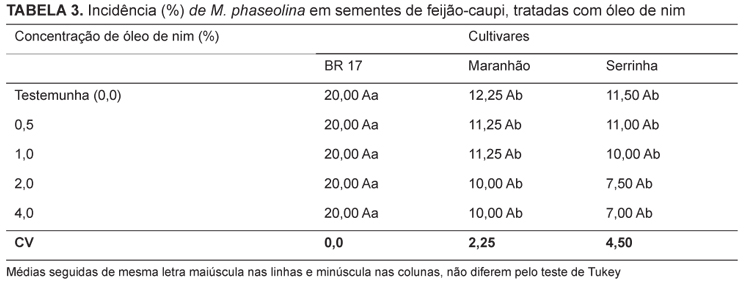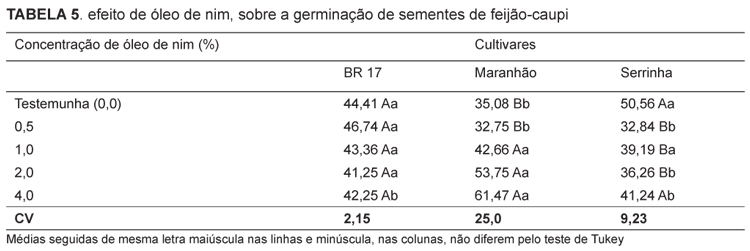This study aimed to evaluate the effect of neem oil on germination and fungi incidence on the seeds of three cowpea cultivars (Serrinha, BR 17 and Maranhão). Dilutions of 0.5; 1.0; 2.0, 4.0 g dm-3 of neem oil were prepared in water. The fungi incidence was evaluated by the filter paper test, and the germination was evaluated according to the Rules for Seeds Testing ("Regras para Análise de Sementes," in Portuguese). Seeds of three cowpea cultivars were used: Serrinha and Maranhão, from the cities of Timon and Viana, respectively, state of Maranhão, Brazil, and BR 17, from Embrapa Meio Norte (Terezina, state of Piaí, Brazil). The growth of Fusarium sp. on the seed of the Maranhão and Serrinha cultivars was reduced in 52 and 53%, respectively, and the reduction rate of Aspergillus sp. was 14 and 20%, on the same cultivars. However, the neem oil did not inhibit the growth of the fungi Macrophomina phaseolina and Phoma sp. in any of the three cultivars. With regard to the seed germination, an increase of 13 and 17.5% was observed in the Maranhão cultivar compared to control, while for the Serrinha cultivar, only the 0.5% concentration differed from the control, reducing the germination rate by 6.49%. We conclude that the neem oil was effective in controlling Aspergillus sp. and Fusarium sp. On the other hand, it was ineffective against Phoma sp. and M. phaseolina. The germination increased in the Maranhão cultivar and decreased in the Serrinha cultivar.
Disease control; Aspergillus sp.; Fusarium sp.; Macrophomina phaseolina; Phoma sp





